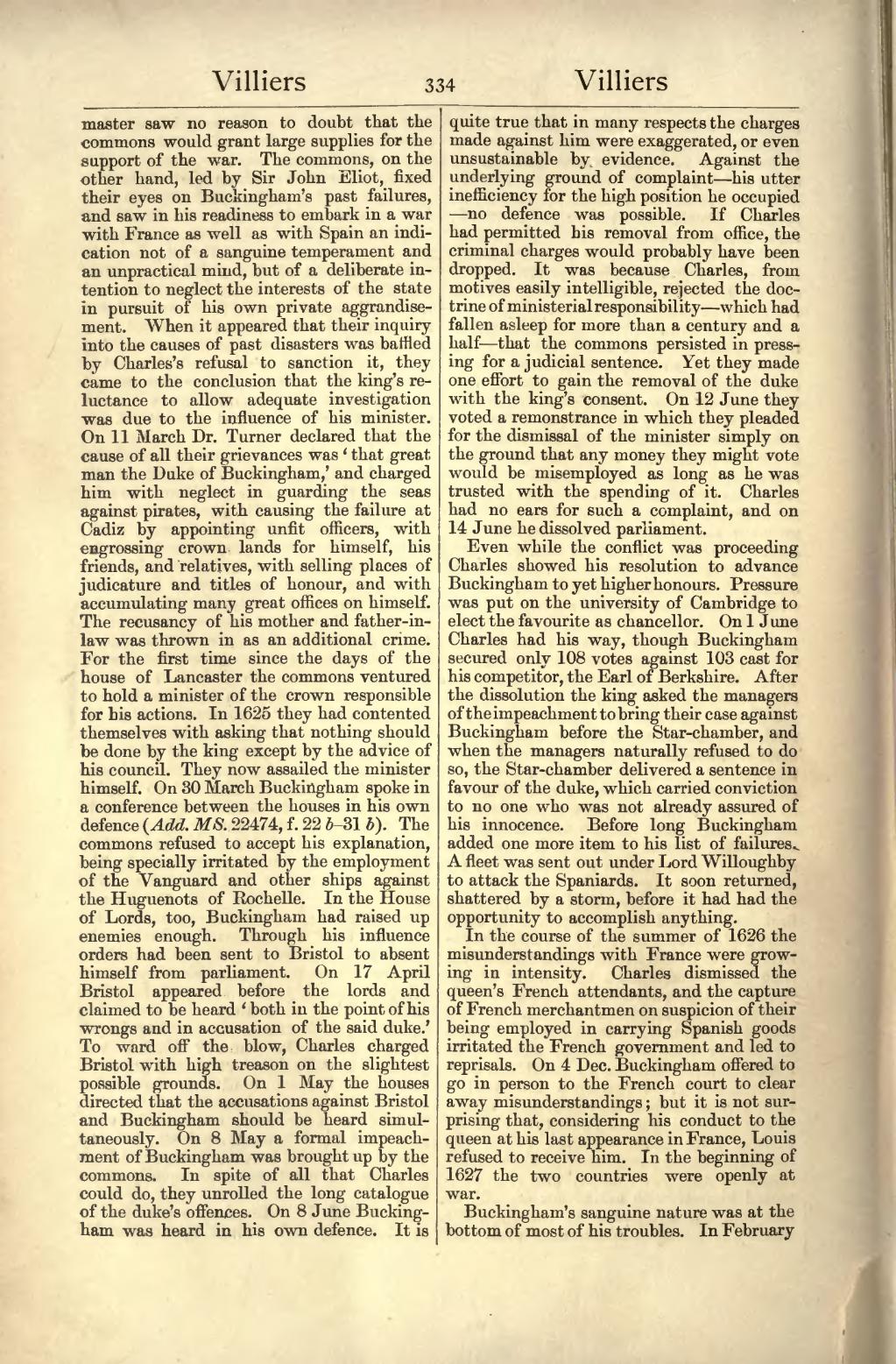master saw no reason to doubt that the commons would grant large supplies for the support of the war. The commons, on the other hand, led by Sir John Eliot, fixed their eyes on Buckingham's past failures, and saw in his readiness to embark in a war with France as well as with Spain an indication not of a sanguine temperament and an unpractical mind, but of a deliberate intention to neglect the interests of the state in pursuit of his own private aggrandisement. When it appeared that their inquiry into the causes of past disasters was baffled by Charles's refusal to sanction it, they came to the conclusion that the king's reluctance to allow adequate investigation was due to the influence of his minister. On 11 March Dr. Turner declared that the cause of all their grievances was ‘that great man the Duke of Buckingham,’ and charged him with neglect in guarding the seas against pirates, with causing the failure at Cadiz by appointing unfit officers, with engrossing crown lands for himself, his friends, and relatives, with selling places of judicature and titles of honour, and with accumulating many great offices on himself. The recusancy of his mother and father-in-law was thrown in as an additional crime. For the first time since the days of the house of Lancaster the commons ventured to hold a minister of the crown responsible for his actions. In 1625 they had contented themselves with asking that nothing should be done by the king except by the advice of his council. They now assailed the minister himself. On 30 March Buckingham spoke in a conference between the houses in his own defence (Add. MS. 22474, f. 22 b–31 b). The commons refused to accept his explanation, being specially irritated by the employment of the Vanguard and other ships against the Huguenots of Rochelle. In the House of Lords, too, Buckingham had raised up enemies enough. Through his influence orders had been sent to Bristol to absent himself from parliament. On 17 April Bristol appeared before the lords and claimed to be heard ‘both in the point of his wrongs and in accusation of the said duke.’ To ward off the blow, Charles charged Bristol with high treason on the slightest possible grounds. On 1 May the houses directed that the accusations against Bristol and Buckingham should be heard simultaneously. On 8 May a formal impeachment of Buckingham was brought up by the commons. In spite of all that Charles could do, they unrolled the long catalogue of the duke's offences. On 8 June Buckingham was heard in his own defence. It is quite true that in many respects the charges made against him were exaggerated, or even unsustainable by evidence. Against the underlying ground of complaint—his utter inefficiency for the high position he occupied—no defence was possible. If Charles had permitted his removal from office, the criminal charges would probably have been dropped. It was because Charles, from motives easily intelligible, rejected the doctrine of ministerial responsibility—which had fallen asleep for more than a century and a half—that the commons persisted in pressing for a judicial sentence. Yet they made one effort to gain the removal of the duke with the king's consent. On 12 June they voted a remonstrance in which they pleaded for the dismissal of the minister simply on the ground that any money they might vote would be misemployed as long as he was trusted with the spending of it. Charles had no ears for such a complaint, and on 14 June he dissolved parliament.
Even while the conflict was proceeding Charles showed his resolution to advance Buckingham to yet higher honours. Pressure was put on the university of Cambridge to elect the favourite as chancellor. On 1 June Charles had his way, though Buckingham secured only 108 votes against 103 cast for his competitor, the Earl of Berkshire. After the dissolution the king asked the managers of the impeachment to bring their case against Buckingham before the Star-chamber, and when the managers naturally refused to do so, the Star-chamber delivered a sentence in favour of the duke, which carried conviction to no one who was not already assured of his innocence. Before long Buckingham added one more item to his list of failures. A fleet was sent out under Lord Willoughby to attack the Spaniards. It soon returned, shattered by a storm, before it had had the opportunity to accomplish anything.
In the course of the summer of 1626 the misunderstandings with France were growing in intensity. Charles dismissed the queen's French attendants, and the capture of French merchantmen on suspicion of their being employed in carrying Spanish goods irritated the French government and led to reprisals. On 4 Dec. Buckingham offered to go in person to the French court to clear away misunderstandings; but it is not surprising that, considering his conduct to the queen at his last appearance in France, Louis refused to receive him. In the beginning of 1627 the two countries were openly at war.
Buckingham's sanguine nature was at the bottom of most of his troubles. In February
